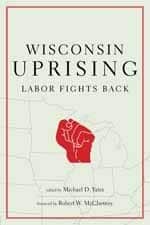A Wisconsin Idea Resurgent
by Allen Ruff
It Started In Wisconsin: Dispatches from the Front Lines of the New Labor Protest
By Mari Jo Buhle & Paul Buhle, editors
London & New York: Verso, 2011, 181 pages, $14.95 paperback.
Wisconsin Uprising: Labor Fights Back
By Michael D. Yates
New York: Monthly Review Press, 2011, 304 pages, $18.95 paperback.
MORE THAN A year has passed since the mass protests of February-March 2011, at Madison and elsewhere across Wisconsin, erupted in response to Republican Governor Scott Walker’s effort to bust the state’s public employee unions. The three-week occupation of the State Capitol building and truly massive outdoor demos in the surrounding streets drew the attention of the entire country and much of the world.
Ongoing rallies, with crowds sometimes numbering well over a hundred thousand, drew organized labor and the unorganized, private and public sector workers, high school and college kids, farmers, the elderly and the young, retirees, the unemployed and recently returned veterans, and whole families with kids and grandkids — from every city, town and county in the state.
The Walker Offensive
Following a bogus campaign promise to create “jobs, jobs, jobs!” newly elected Walker announced at the beginning of his November 2010 victory speech that “Wisconsin is open for business!”
Even before taking office, Walker succeeded in killing an $800 million federal grant for a high-speed rail line connecting Madison and Milwaukee, a move that cost the state an estimated $100 million in preexisting agreements.
Barely mentioned as the February protests grew, the new administration’s offensive came on the heels of a retrenchment imposed upon state employees, in the form of further concessions and unpaid “furlough days” mandated by the preceding governor, Democrat Jim Doyle.
When word of what was contained in Walker’s “budget repair bill” spread in mid-February, a largely spontaneous protest rapidly grew. What eventually came to be viewed primarily as an outright attempt to destroy public sector unionism, Walker’s proposal also threatened numerous drastic cuts or an end to remaining social services including “Badgercare,” the state-wide equivalent to Medicare, assistance to the elderly, the disabled, poor families and children in need.
The bill promised decreased funding for public education. Masked by the rhetoric of “deficit reduction,” it also sought to restructure or eliminate and privatize a number of state agencies, to remove them from civil service oversight by placing them directly under control of governor-appointed boards or panels.
The “repair bill” proposed privatizing assets such as state-owned power plants, and called for ending the limits on the allowable levels of environmentally damaging agricultural phosphates — a bone to large agribusiness. Aspects of the bill, ostensibly a needed “belt tightening” induced by state deficits and the Great Recession, threatened to place additional fiscal pressures and new burdens on already strained counties and municipalities statewide.
Coming on the heels of tax breaks for the wealthiest families and corporations, the proposal also demanded new rounds of concessions from all public employees, with the exception of fire fighters and police.
Every item of the Walker agenda fueled the popular outrage. Largely unanticipated and unimaginable beforehand, the popular response made history.
New Populism in the Streets
That outpouring in opposition to the Walker agenda immediately birthed a torrent of descriptive accounts and commentary, much of it centered on a central question, “Why Wisconsin?”
Two recently released collections — It Started in Wisconsin compiled by the Madison-based historians Paul and Mari Jo Buhle, and Wisconsin Uprising: Labor Fights Back edited by the working-class journalist, Michael Yates — have offered up a number of important perspectives and insights in response to that question and much more. Collectively, both convey some deeper understandings and offer important lessons valuable for struggles to come. Both will stand as future reference points for those wishing to get some later handle on what happened in the “Badger State.”…
Read the entire review in Against the Current

Comments are closed.